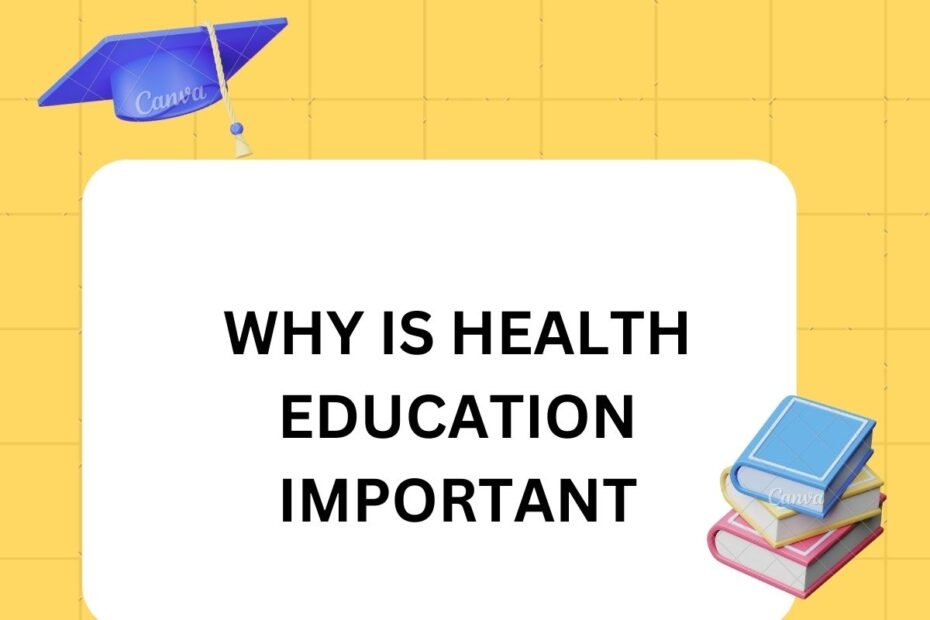Why is Health Education important? The Crucial Role of Health Education in Shaping Futures in 2024 – In 2024, health education emerges as a cornerstone of future well-being, wielding the power to transform lives through informed decision-making and proactive health management. By equipping individuals with the knowledge to navigate an increasingly complex healthcare landscape, health education fosters a culture of prevention and empowerment, shaping healthier futures and resilient communities.

What is the role of Education in shaping of the Future /The Crucial Role of Health Education in Shaping Futures in 2024
In 2024, health education stands at the forefront of societal advancement, acting as a beacon that illuminates the path to improved well-being and informed choices. In a world where medical advancements and health information proliferate, the role of health education becomes pivotal in equipping individuals with the essential knowledge to navigate this ever-evolving landscape. It empowers people not only to understand and manage their health more effectively but also to make proactive decisions that prevent illness and promote overall wellness.
Moreover, health education transcends mere information dissemination; it fosters a culture of empowerment and resilience. By integrating innovative tools and interactive learning platforms, health education is transforming how we approach personal and community health. This approach ensures that individuals are not just passive recipients of health advice but active participants in their own health journeys, shaping a future where informed, engaged citizens lead healthier and more fulfilling lives.
AIMS OF HEALTH EDUCATION/ Importance of education in shaping future
Health education , The aims of health education in 2024 are evolving to embrace a comprehensive and dynamic approach, focusing on empowering individuals with the knowledge and skills to actively manage their health. This involves not only imparting essential information about disease prevention and healthy living but also fostering critical thinking and self-efficacy. By integrating interactive learning tools and real-world applications, health education seeks to make complex health concepts accessible and actionable, enabling individuals to make informed choices and adopt sustainable health practices.
Furthermore, health education aims to bridge gaps in health equity by tailoring information and resources to diverse populations, addressing cultural and socioeconomic factors that influence health behaviors. Through community engagement and personalized education strategies, it strives to create inclusive environments where everyone can access the tools they need to improve their well-being. This holistic approach ensures that health education is not just about delivering content but about inspiring lasting change and promoting a healthier, more informed society.
PRINCIPLES OF HEALTH EDUCATION
In 2024, the principles of health education are redefining the approach to nurturing well-being by embracing a holistic and person-centered framework. At the core of these principles is the commitment to making health education relevant and actionable, ensuring that it resonates with individuals’ lived experiences and addresses their unique needs. This involves tailoring messages to diverse audiences, using clear, engaging communication methods, and integrating real-life scenarios to bridge the gap between knowledge and practice.
Equally important is the principle of empowerment, which emphasizes equipping individuals with the skills and confidence to take charge of their health. By fostering critical thinking, encouraging active participation, and leveraging innovative technologies, health education aims to build a foundation of self-efficacy and resilience. This approach not only supports informed decision-making but also promotes a proactive attitude towards health, ensuring that individuals are well-prepared to navigate their health journeys and contribute to a healthier community.
STAGES IN EDUCATION
In 2024, the stages in education have evolved into a dynamic continuum that seamlessly integrates learning with real-world application. This modern approach begins with foundational education, where basic concepts are introduced through interactive and engaging methods that cater to diverse learning styles. From early childhood to adulthood, each stage is designed to build upon previous knowledge, ensuring a cohesive learning experience that adapts to individual growth and changing societal needs.
As learners advance, the focus shifts to deeper, more specialized education that emphasizes critical thinking, problem-solving, and practical skills. This stage involves experiential learning opportunities, such as simulations and collaborative projects, that bridge the gap between theory and practice. By incorporating technology and real-world challenges into the curriculum, this progressive approach ensures that education remains relevant and impactful, preparing individuals not just to excel academically but to thrive in a rapidly evolving world.
CONCLUSION Why is health education important?
In conclusion, health education is a pivotal force in shaping a healthier society by empowering individuals with the knowledge and skills necessary to make informed decisions about their well-being. By fostering a deep understanding of health principles and encouraging proactive management, health education not only mitigates the risk of disease but also cultivates a culture of prevention and resilience. As we navigate an increasingly complex healthcare landscape, the role of health education becomes more critical in equipping people to take charge of their health and advocate for their needs.
Moreover, health education serves as a bridge between medical advancements and everyday practice, ensuring that cutting-edge knowledge translates into practical, actionable steps for individuals. By integrating innovative teaching methods and addressing diverse needs, it ensures that health information is accessible, relevant, and engaging. This holistic approach not only improves individual health outcomes but also strengthens community well-being, laying the groundwork for a future where informed and empowered individuals contribute to a more resilient and health-conscious society.
Read more about health education: Future of Public Health NCBI site
Read more post about Migraine
Definition of health education.
Health education is the sum of multiple experiences which influence the attitudes, habits and knowledge relating to community health and individual
Aims of health education.
Health education aims to immediately impact an individual’s knowledge, attitude, behavior about a health related topic with the ultimate aim of improving quality of health and life status for an individual


Watch videos from the guy’s viewpoint to feel just like you’re right in the center
of the action and obtain a good view! You can get big booties in just
about any other category you can think of! Whether you’re
into curvy teens, attractive MILFs, or thick Asians, each of them
have a spot here. Check out the bouncing, backshots, and incredible action in group sex, gangbangs,
anal, one-on-one, and much more. https://shrus-privod.ru/bitrix/redirect.php?goto=https%3A%2F%2Fmiracal.ru%2Freclama.php%3Fexec%3Dsensual-webbqdq925813.blogdiloz.com%252F26673162%252Fshould-fixing-how-to-find-nudes-take-60-steps